
Digital events on self-care
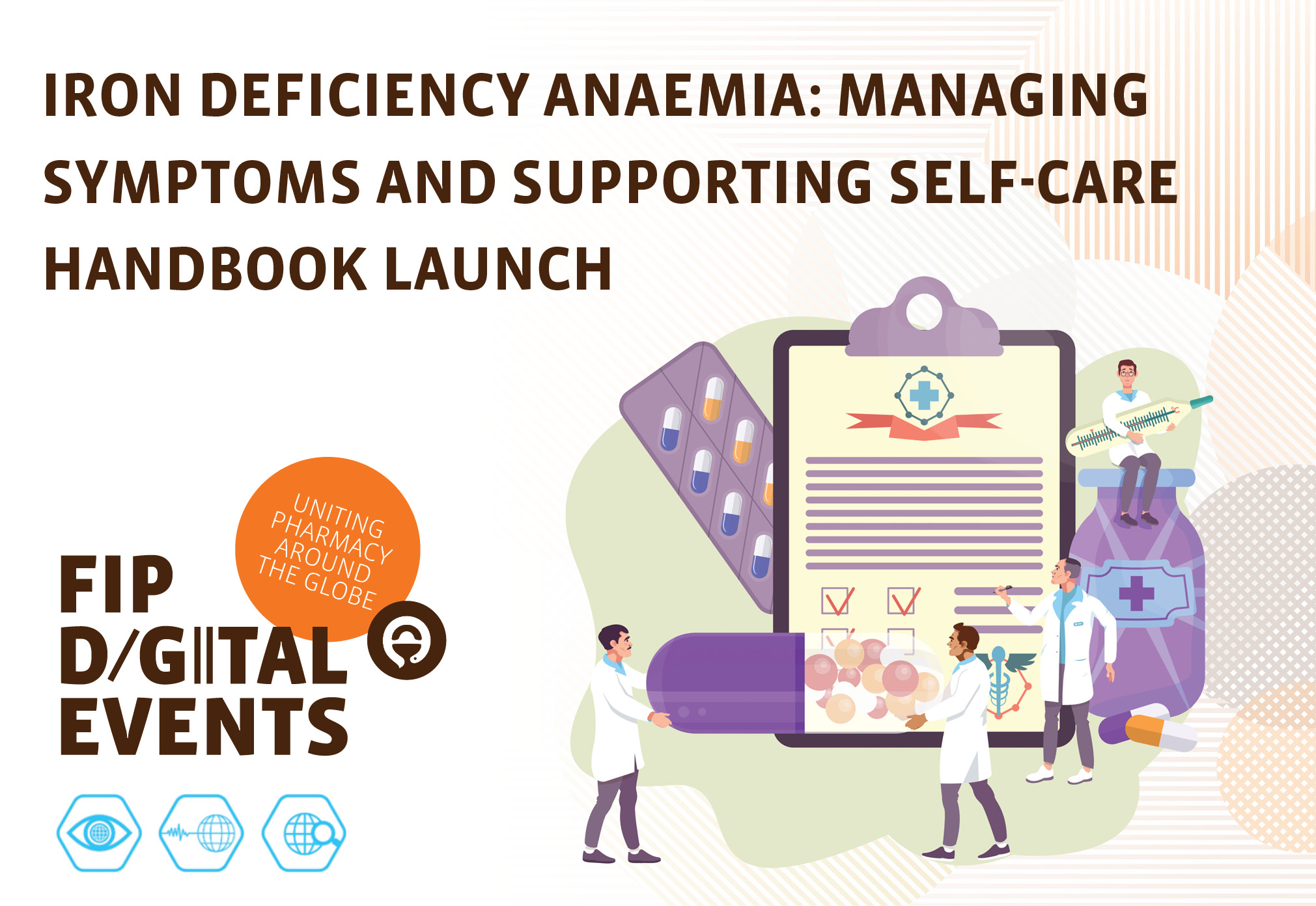
Iron Deficiency Anaemia: Managing Symptoms and Supporting Self-Care Handbook Launch
Join our digital event featuring FIP experts and specialists in Iron Deficiency Anaemia (IDA) for a key discussion on the evolving role of pharmacists in IDA prevention and management. We will launch the "Iron Deficiency Anaemia: Managing Symptoms and Supporting Self-Care" handbook, equipping pharmacists with practical insights. We will explore global data and trends, engage in interactive activities, and gain a deeper understanding of IDA. Learn from community and clinical pharmacists' perspectives and join a panel discussion with experts to address challenges, technological advancements, patient education, and collaborative care models in IDA management.
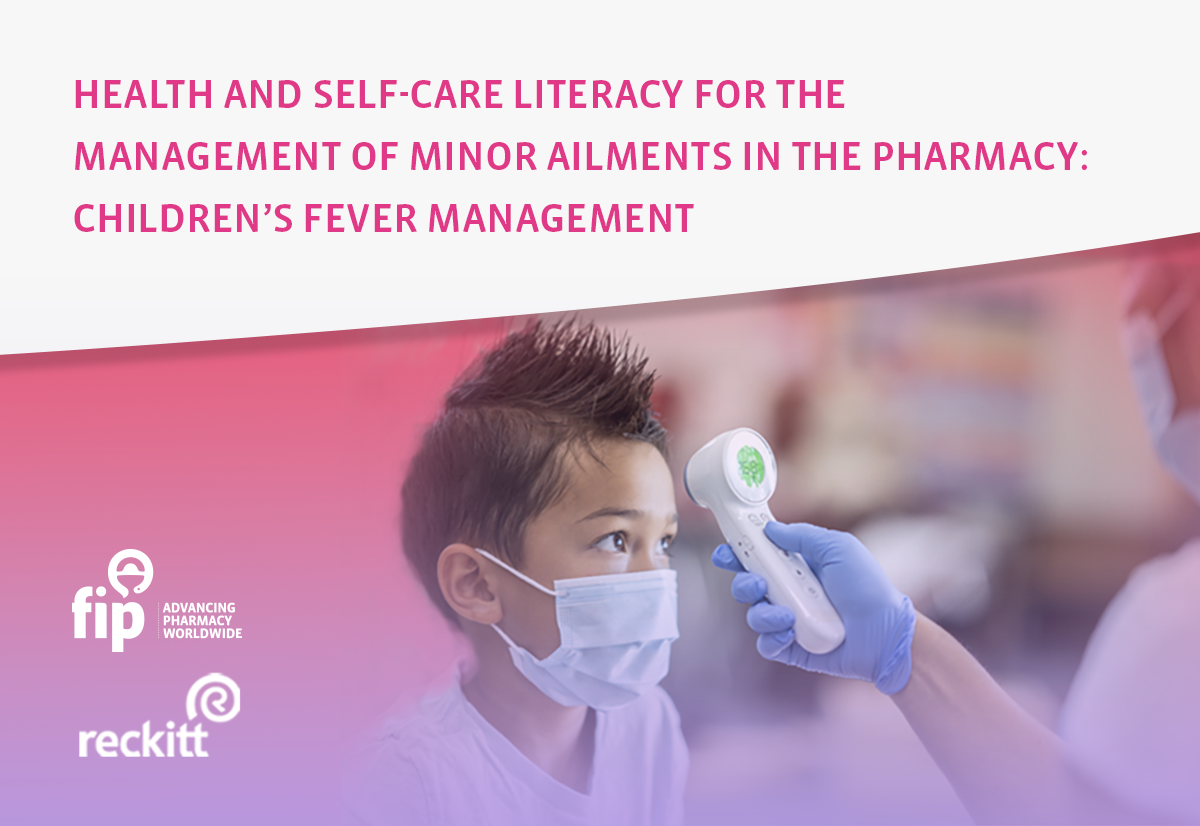
Health and self-care literacy for the management of minor ailments in the pharmacy-Children's fever management
Empowering patient self-care improves health outcomes and reduces the burden of diseases. Improving health and self-care literacy is key to empowering pharmacy-based self-care. This is especially important when it comes to the management of minor ailments through pharmacy. Consisting of a series of five events focusing on common health issues, this new FIP digital programme aims to examine how pharmacists can be enabled to improve health and self-care literacy. Approaches for each of the five areas of minor ailments will be discussed including embedding health and self-care literacy into education and training, developing self-diagnosis and self-medication protocols, widening access to patient information, and improving referral strategies.
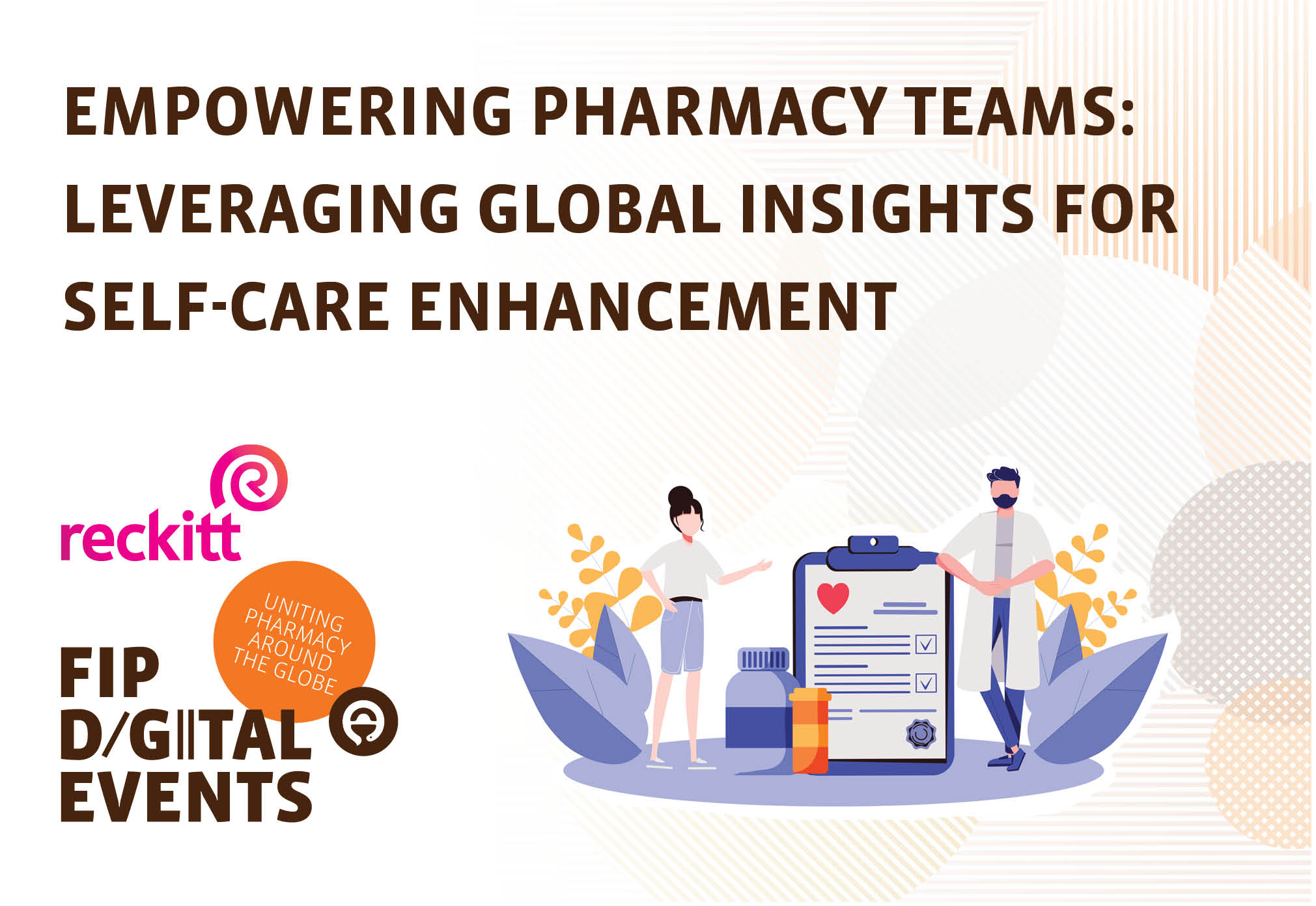
Empowering Pharmacy Teams: Leveraging Global Insights for Self-Care Enhancement
This event holds significant importance as it aims to discuss effective strategies for empowering pharmacy teams in their self-care practices. We will explore various aspects, including leveraging technology, showcasing successful community pharmacy initiatives, and emphasizing the importance of patient engagement.
By bringing together experts and stakeholders, this event will foster knowledge exchange, shed light on global insights, and provide practical approaches to enhance self-care within the pharmacy profession.
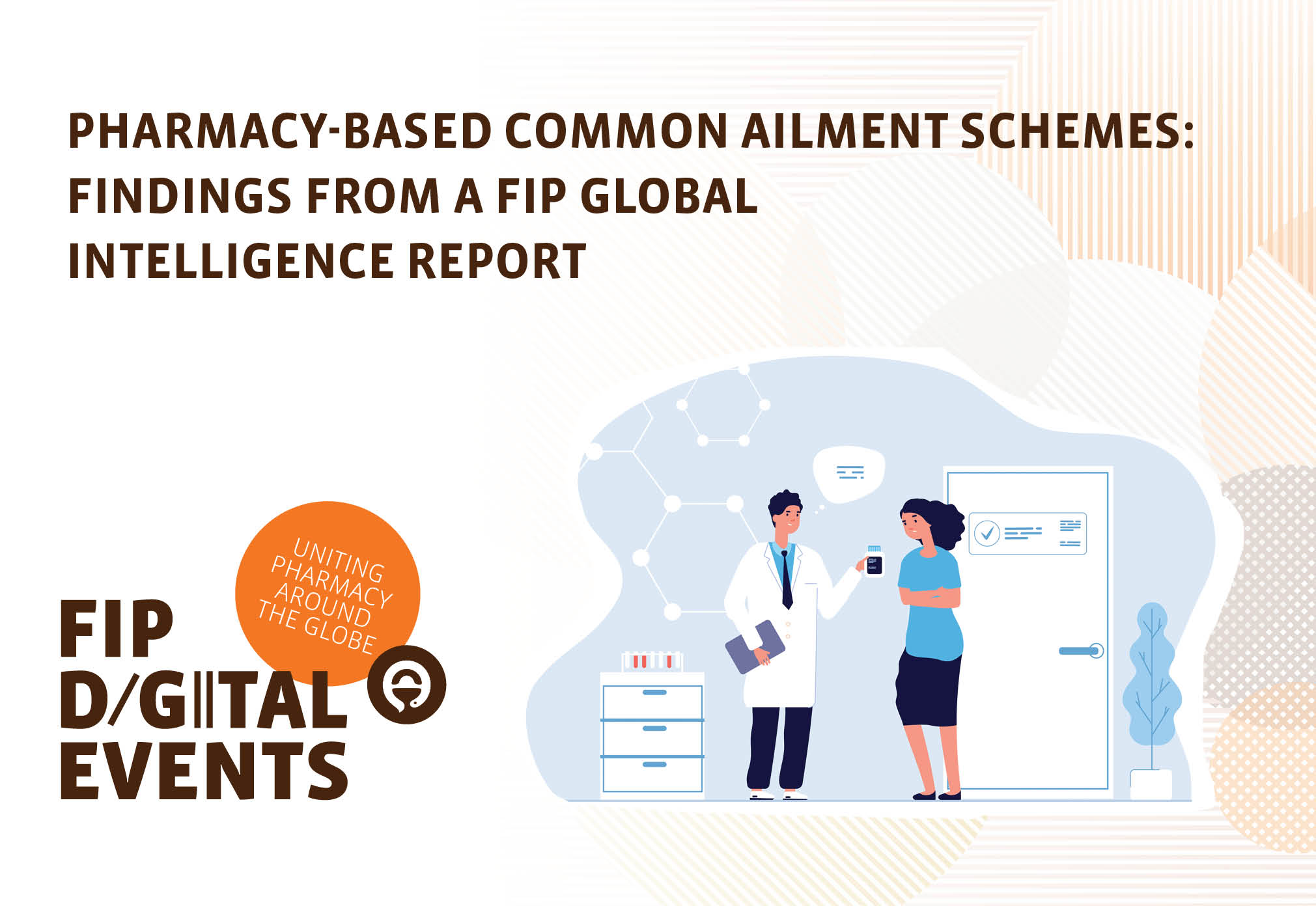
Pharmacy-based Common Ailment Schemes: Findings from a FIP global intelligence report
Common ailment schemes (CAS) (aka minor ailment schemes) are programmes where patients can receive advice, care and, when needed, treatment for an agreed range of common, self-limiting health problems, generally without the need for appointment. They are equally important for triaging patients that do require being seen by a medical doctor or nurse. Such schemes greatly contribute to providing accessible, agile and quality care to patients, and to reducing pressure on general practice and emergency departments, thus making health systems more efficient. FIP conducted a global study on common ailments schemes, including a literature review, a survey of its member organisations, a compilation of case studies and an insight board meeting.
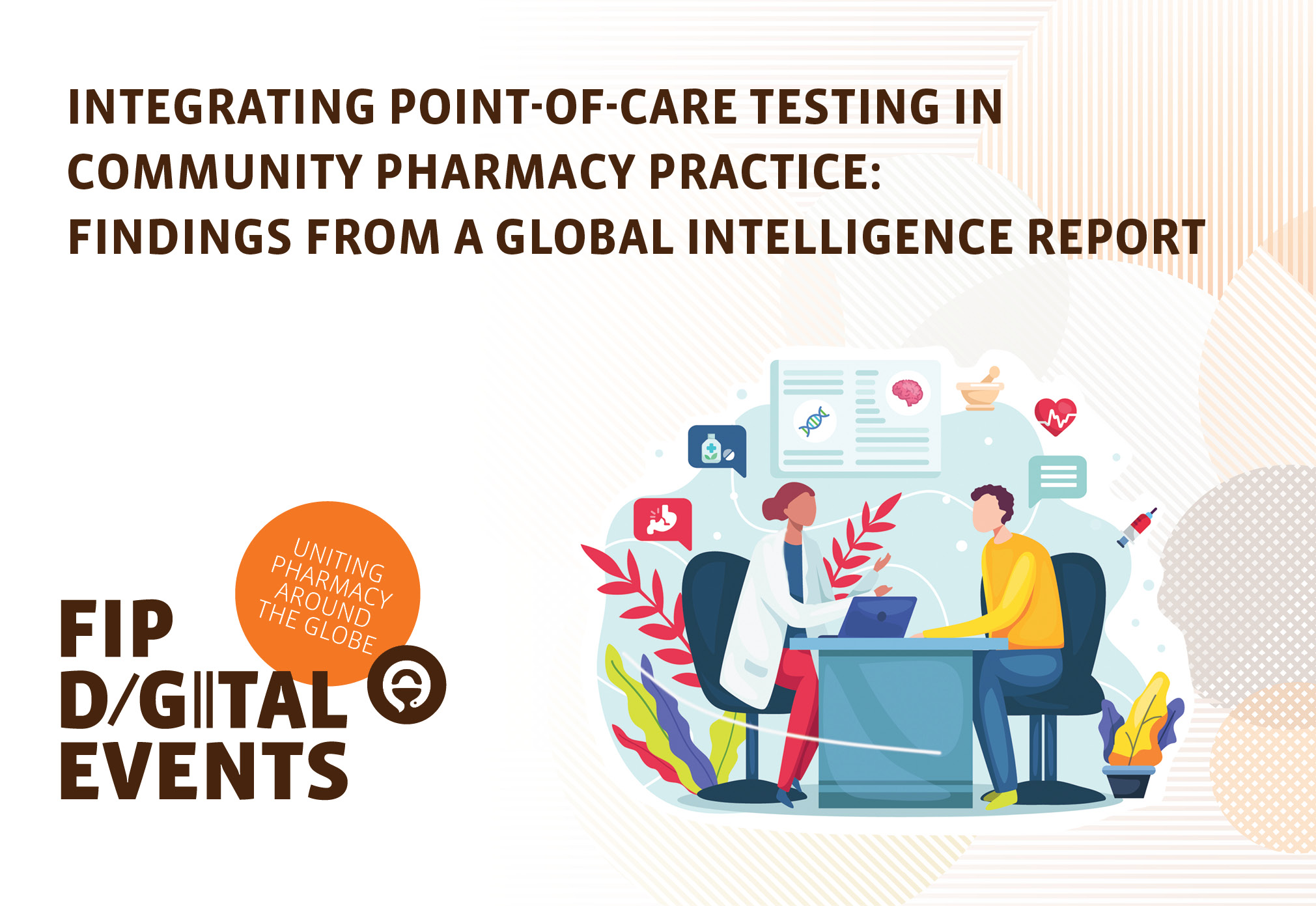
Integrating point-of-care testing in community pharmacy practice: Findings from a global intelligence report
Pharmacy professionals are fully committed to an interprofessional and person-centred approach to healthcare. Where the regulatory framework allows, a wide range of point-of-care tests (POCT) can be carried out in community pharmacies. POCT can be incorporated into disease management programmes to monitor the effects of treatment in people living with non-communicable diseases. In addition, in acute situations, pharmacy professionals can use POCT to support clinical decision-making and provide rapid, safe pharmaceutical care. These tests provide valuable data to inform health-related decisions and reduce avoidable visits to primary care physicians or emergency departments.
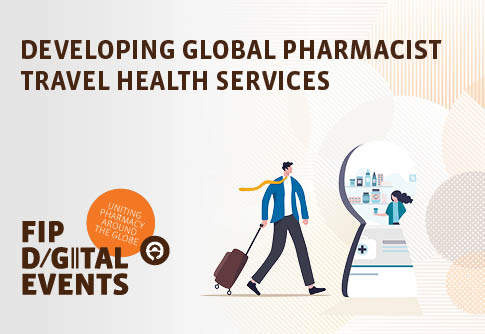
Developing Global Pharmacist Travel Health Services
The demand for travel health and travel medicine services is rapidly growing with the return levels of international travel. Patients are frequently turning to community pharmacies for advice on disease reduction and maintaining personal health whilst travelling. Pretravel preparation is important for many reasons one of which is supporting Global Health policies and strategies.
In some countries legislation has been devolved to allow pharmacists to prescribe medication and vaccinate travellers. However, this is not the situation globally and the many countries place restrictions on this type of pharmacy practice.
Learning objectives:
- To raise the awareness of pretravel consultation service that can be provided in a community setting without prescribing or vaccination.
- To identify over-the-counter products that can be supplied to support travellers visiting a pharmacy
- Compare and contrast classes of over-the-counter products for selected conditions and identify/select appropriate patients for their use.
- Showcase the collaborations with the International Institute of Travel Medicine through membership of ISTM and completion of Certificate of Health
Moderator:
- Daragh Connolly, President Community Pharmacy Section, Ireland
Panelists:
- Derek Evans, Pharmacist Specialist in Travel Medicine Evans Travel Health consultancy, UK
- Karl Hess, Director, Community Pharmacy Practice Innovations Department of Pharmacy Practice, Chapman University School of Pharmacy, Irvine, California, USA
- Sheila Seed, Professor and Chair of Pharmacy Practice, Massachusetts College of Pharmacy and Health Sciences, USA
- Larry Goodyer, Professor of Pharmacy Practice, Leicester School of Pharmacy Faculty of Health and Life Sciences, De Montfort University, UK
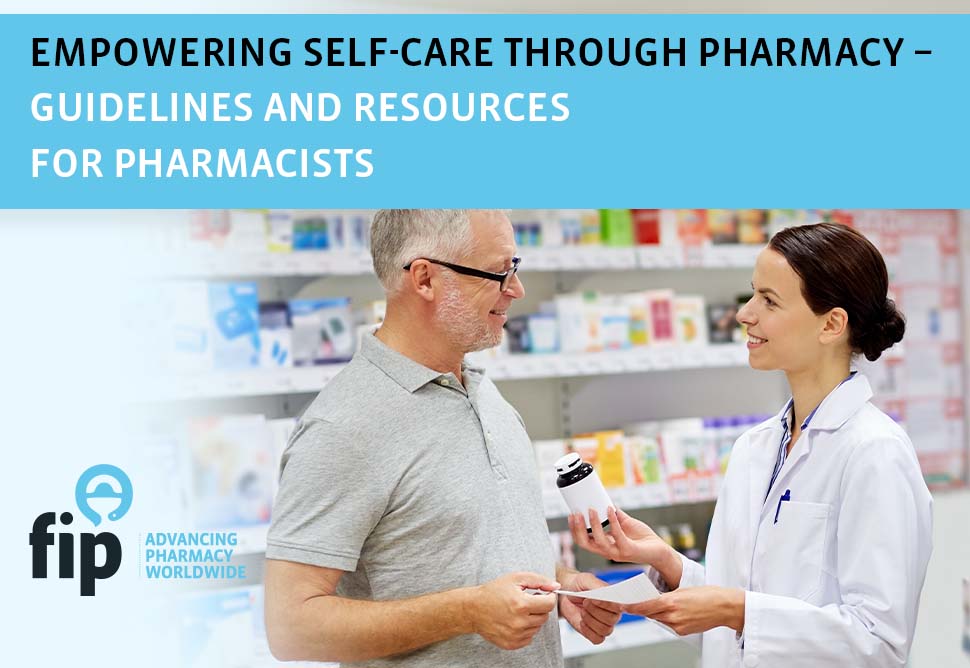
Empowering self-care through pharmacy – Guidelines and resources for pharmacists
Self-care is an integral part of healthcare systems, contributing to healthcare cost savings, better allocation of resources and improved health outcomes in the population. Pharmacists are well placed in the community to support health-related decisions and facilitate informed self-care. FIP aims to support pharmacists in this role through advocacy and by developing professional resources in the area of self-care. This event will showcase a variety of FIP publications, including the launch of a new handbook.
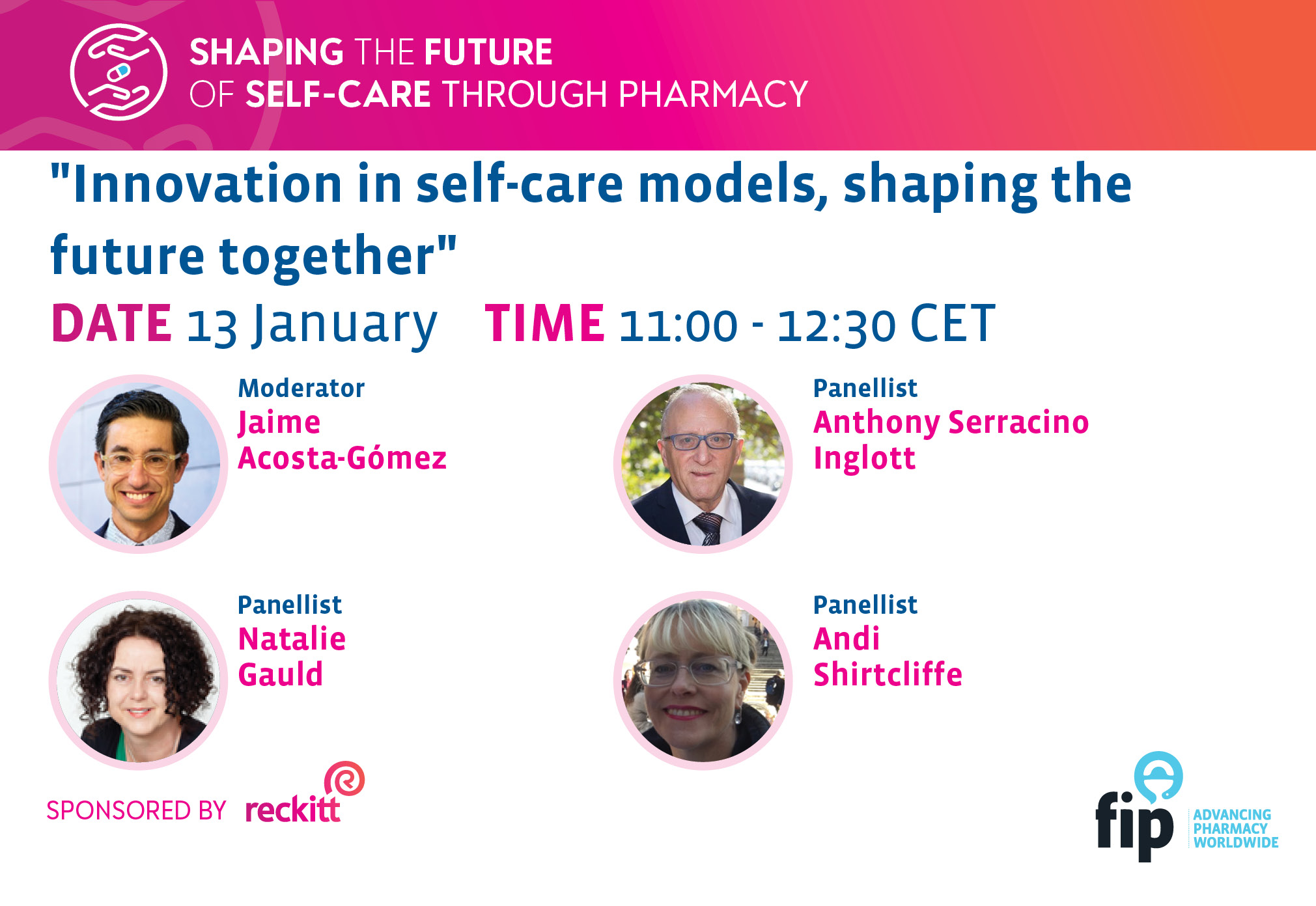
Innovation in self-care models, shaping the future together.
This event discusses how targeted switching of prescription only medicines to non-prescription medicines (Over The Counter medicines) can contribute to self-care of a nation’s population. Availability of diagnostics in the pharmacy and beyond can also make an impact on self-care.
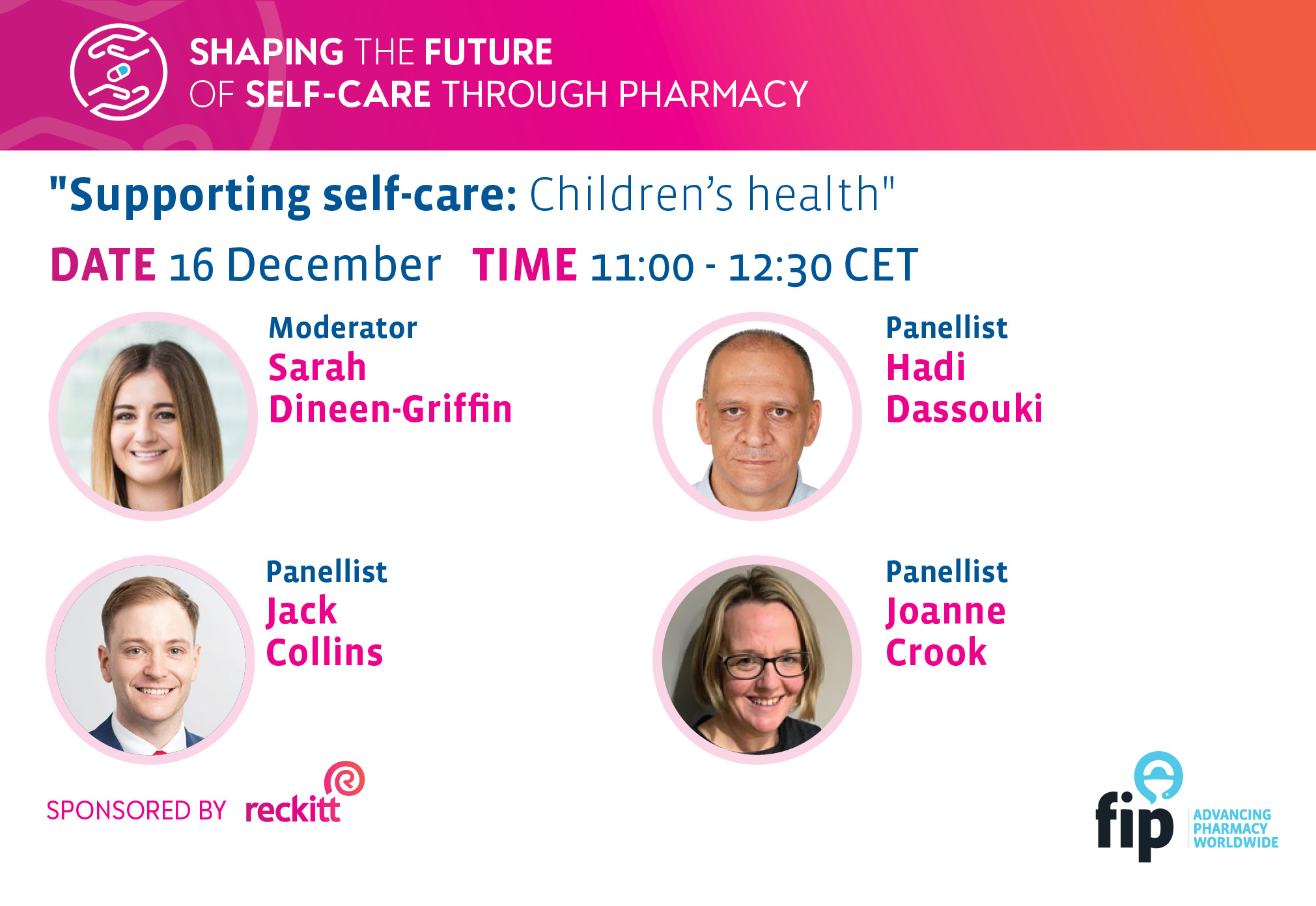
Supporting self-care: children's health
Pharmacy teams are increasingly supporting children and their carers with self-care. This webinar will focus particularly on appropriate management of choices of medicines and products to support children’s health, and the role of the pharmacist. A case study will be presented and the event will conclude with a panel discussion.
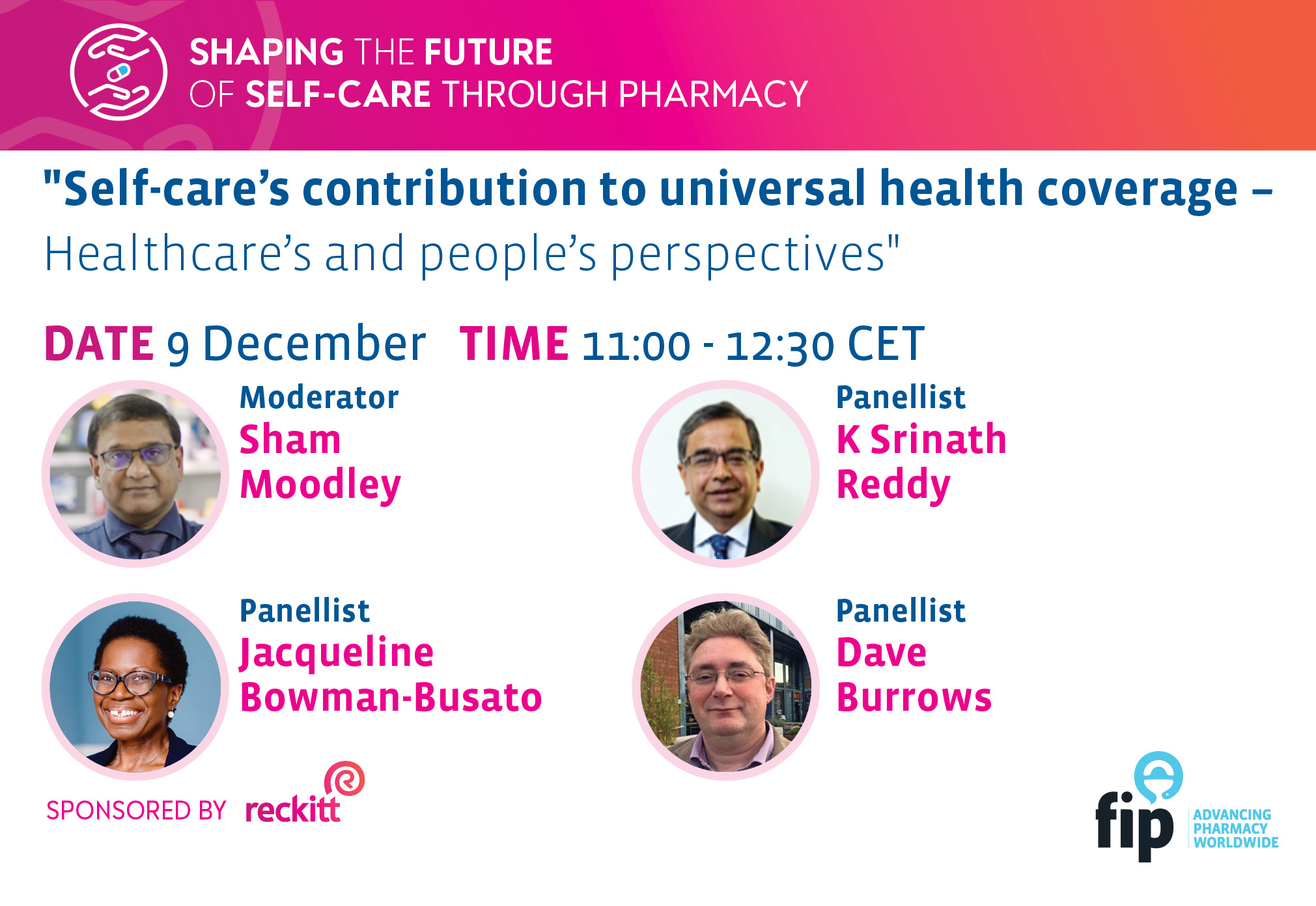
Self-care’s contribution to universal health coverage – Healthcare’s and people’s perspectives
There is variability across the globe in the provision of universal healthcare. Self-care is the ability to maintain and improve individual’s health, prevent or limit diagnosed illnesses, and address self-treatable conditions. Self care is not no care and it is not necessarily practised in isolation. It may involve support and advice from others, such as expert pharmacy teams. This event discusses how self-care can contribute to Universal Health Coverage from the perspectives of providers of healthcare services and public and patients.
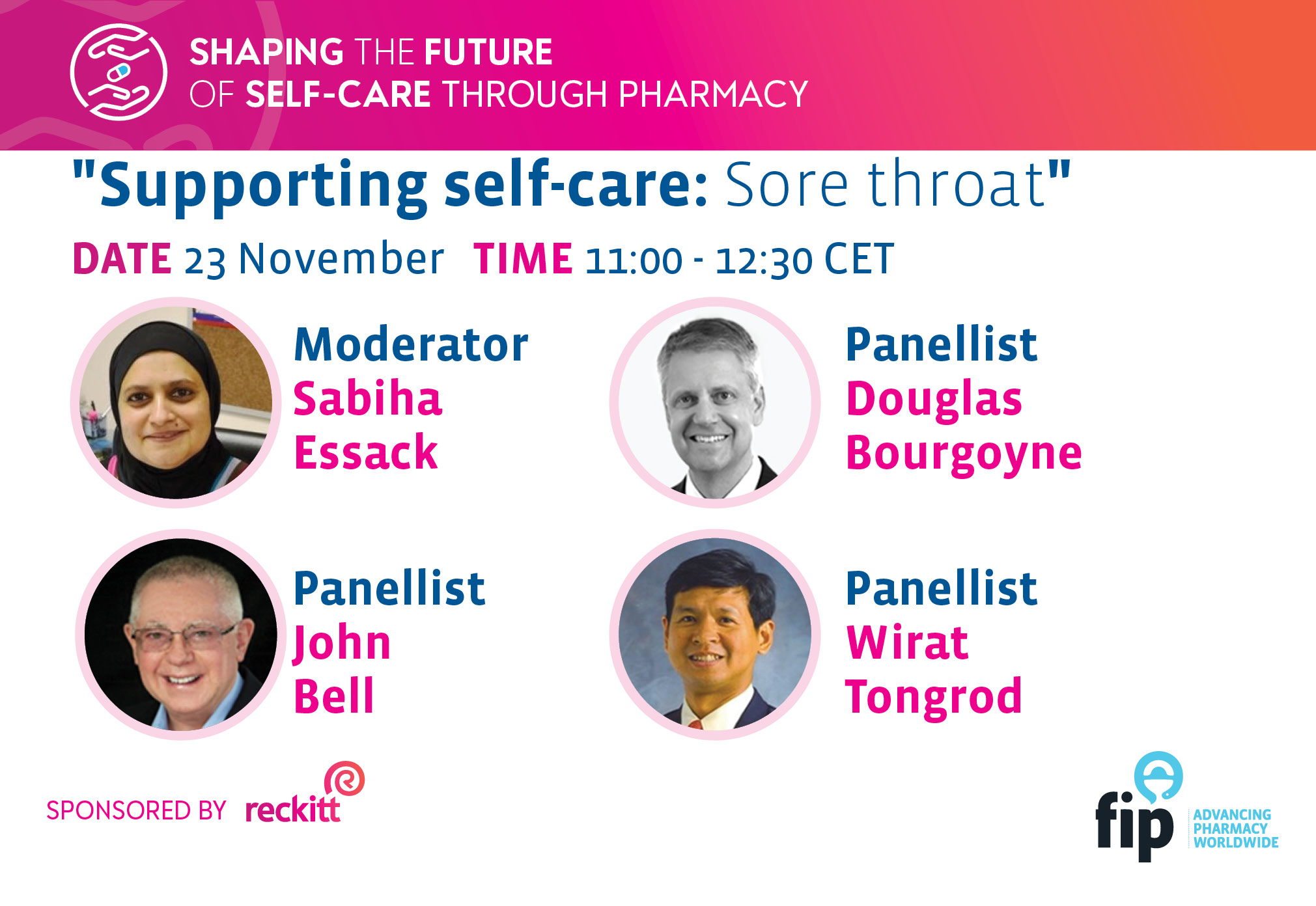
Supporting self-care: Sore throat
Sore throat is a common self-limiting condition which often leads to patients presenting in the pharmacy for advice, treatment options and reassurance. Sore throat is predominantly a viral condition for which symptomatic management offers the most appropriate course of action. Effective diagnosis, communication and managing expectations can prevent unnecessary onward referral or inappropriate antibiotic use.
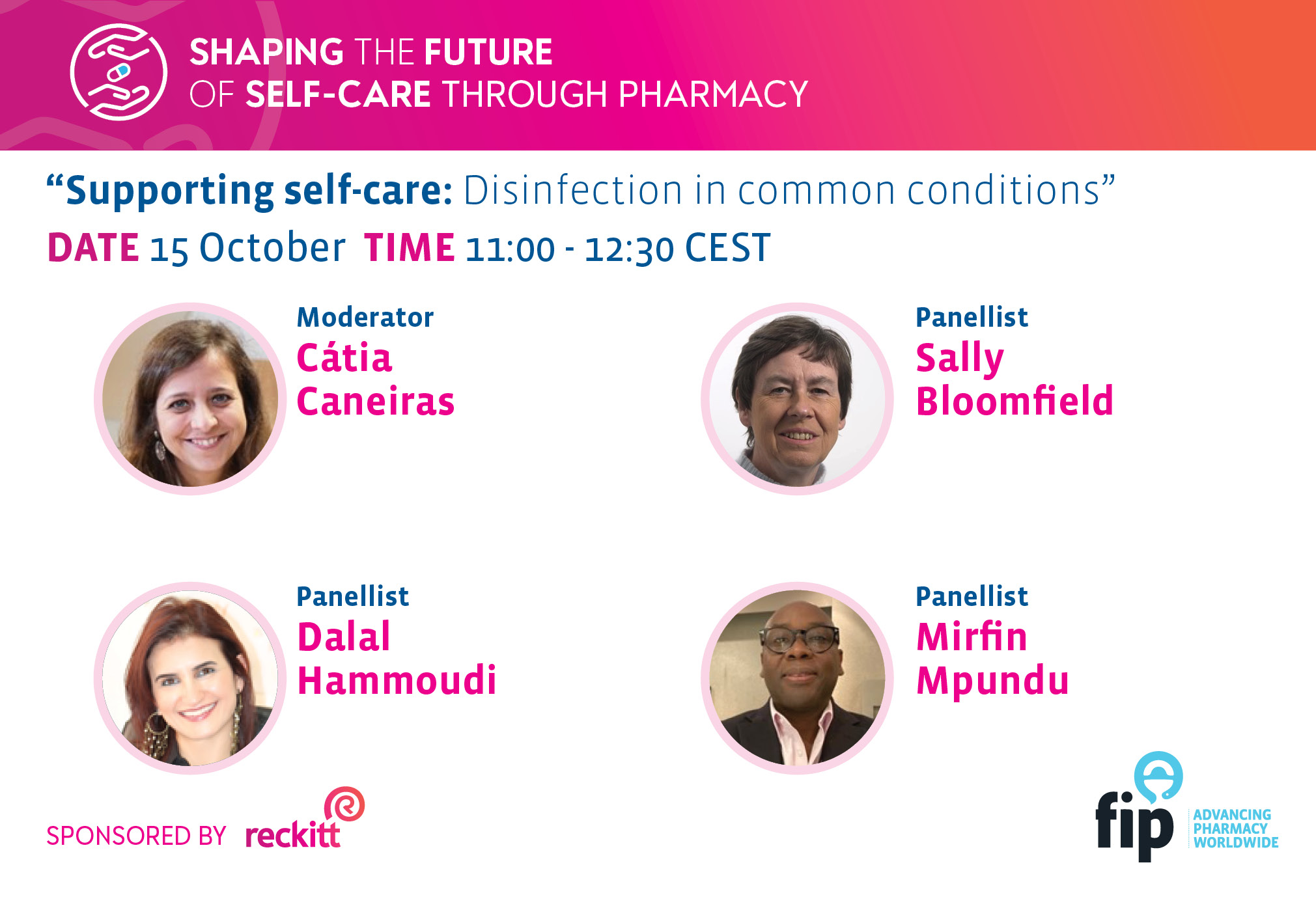
Supporting self-care: disinfection in common conditions
Hygiene practices including hand and surface disinfection form part of our first line of defence by helping to reduce the spread of the infections such as COVID-19. These interventions also have an impact on many common infections such as cold and seasonal flu. The pharmacy team are the most accessible healthcare provider and are a convenient source of advice for patients and public in the maintenance of appropriate hand and surface hygiene practices.
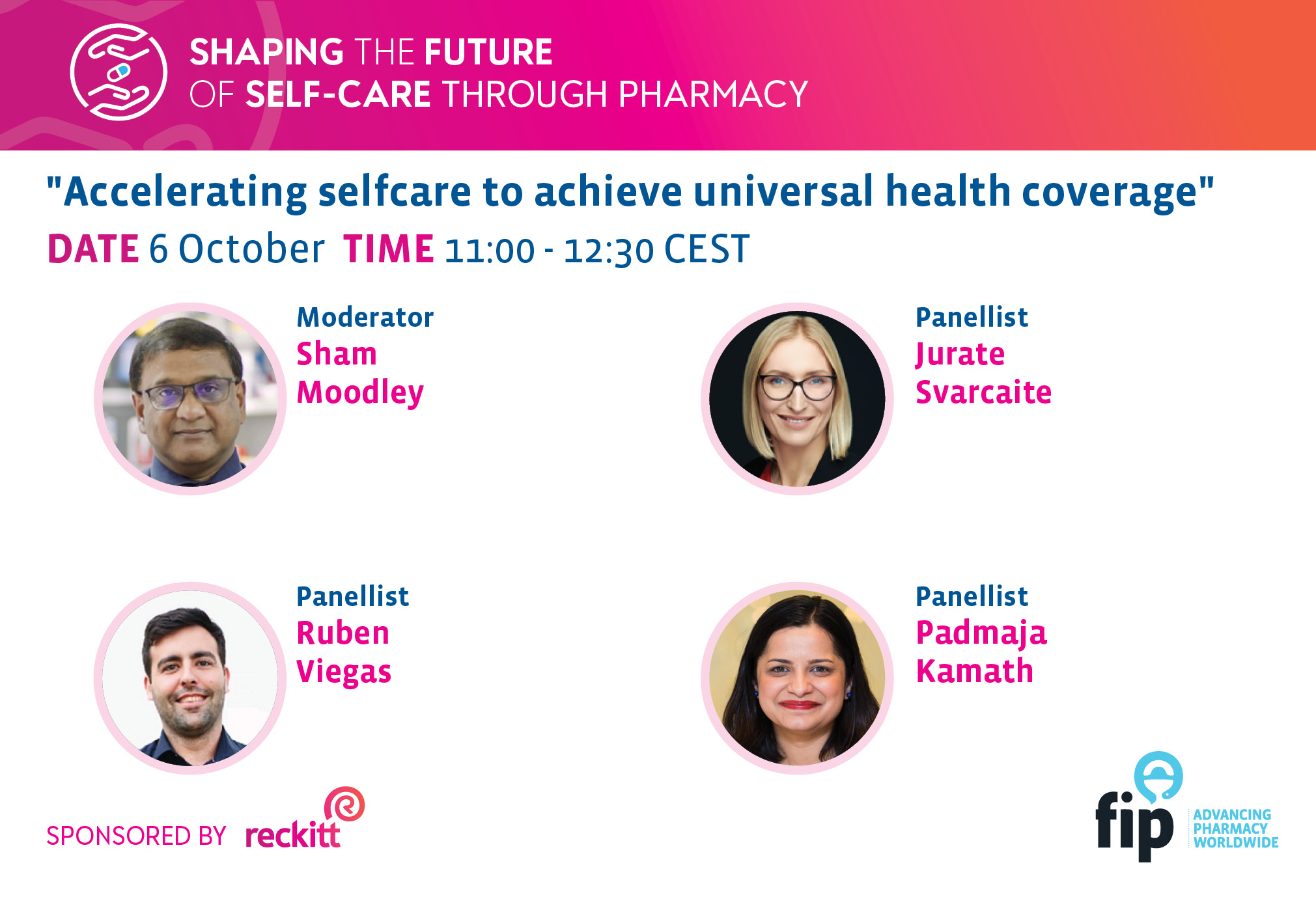
Accelerating selfcare to achieve Universal Health Coverage
This event asked how healthcare can be rebuilt amidst a global pandemic and focus on the important role that selfcare plays. It also looked at the enablers that will accelerate self-care through community pharmacy and how this builds towards Universal Health Coverage.
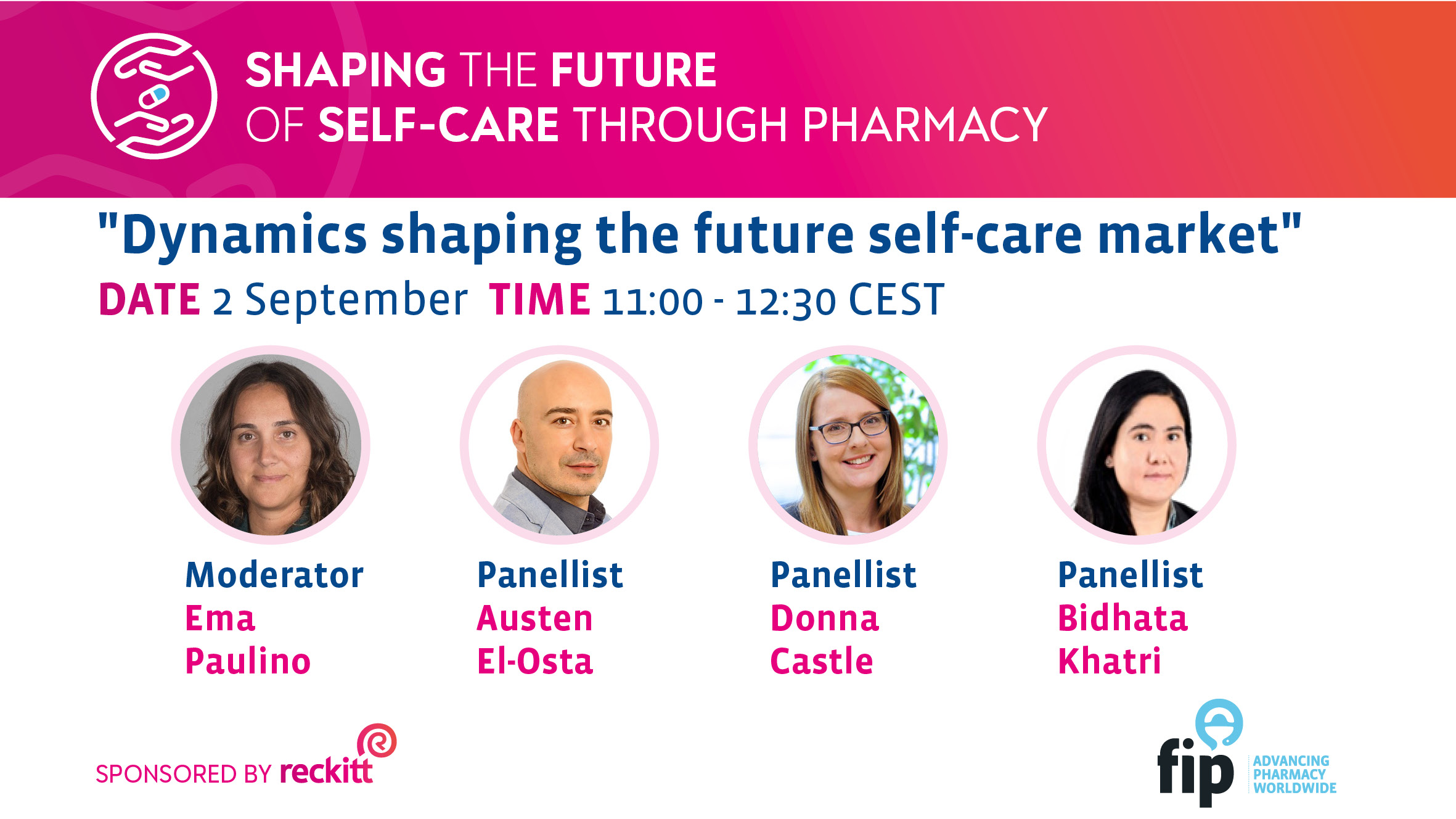
Dynamics shaping the future self-care market
Self-care can empower consumers by giving them the knowledge and tools to improve the quality of their daily lives. For example, consumers often treat minor symptoms, such as a mild headache or a cold, themselves using products purchased over-the-counter at a local pharmacy or grocery store.
In 1998, a special working group of the World Health Organization (WHO) offered an inclusive definition of self-care: “Self-care in health refers to the activities individuals, families and communities undertake with the intention of enhancing health, preventing disease, limiting illness, and restoring health. These activities are derived from knowledge and skills from the pool of both professional and lay experience. They are undertaken by lay people on their own behalf, either separately or in participative collaboration with professionals.”
In today’s rapidly changing healthcare environment, self-care should be recognised as an integral element of a coordinated and comprehensive national health policy.
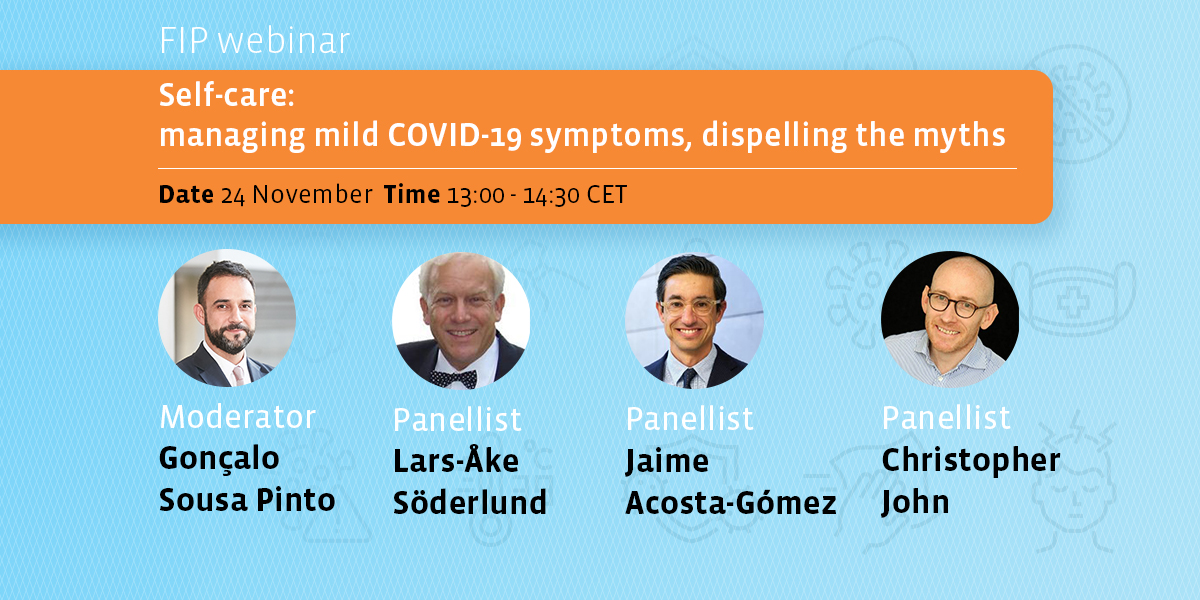
Self-care: managing mild COVID-19 symptoms, dispelling the myth
The aim of this event is to describe an evidence-based approach to self-care of mild COVID-19 symptoms
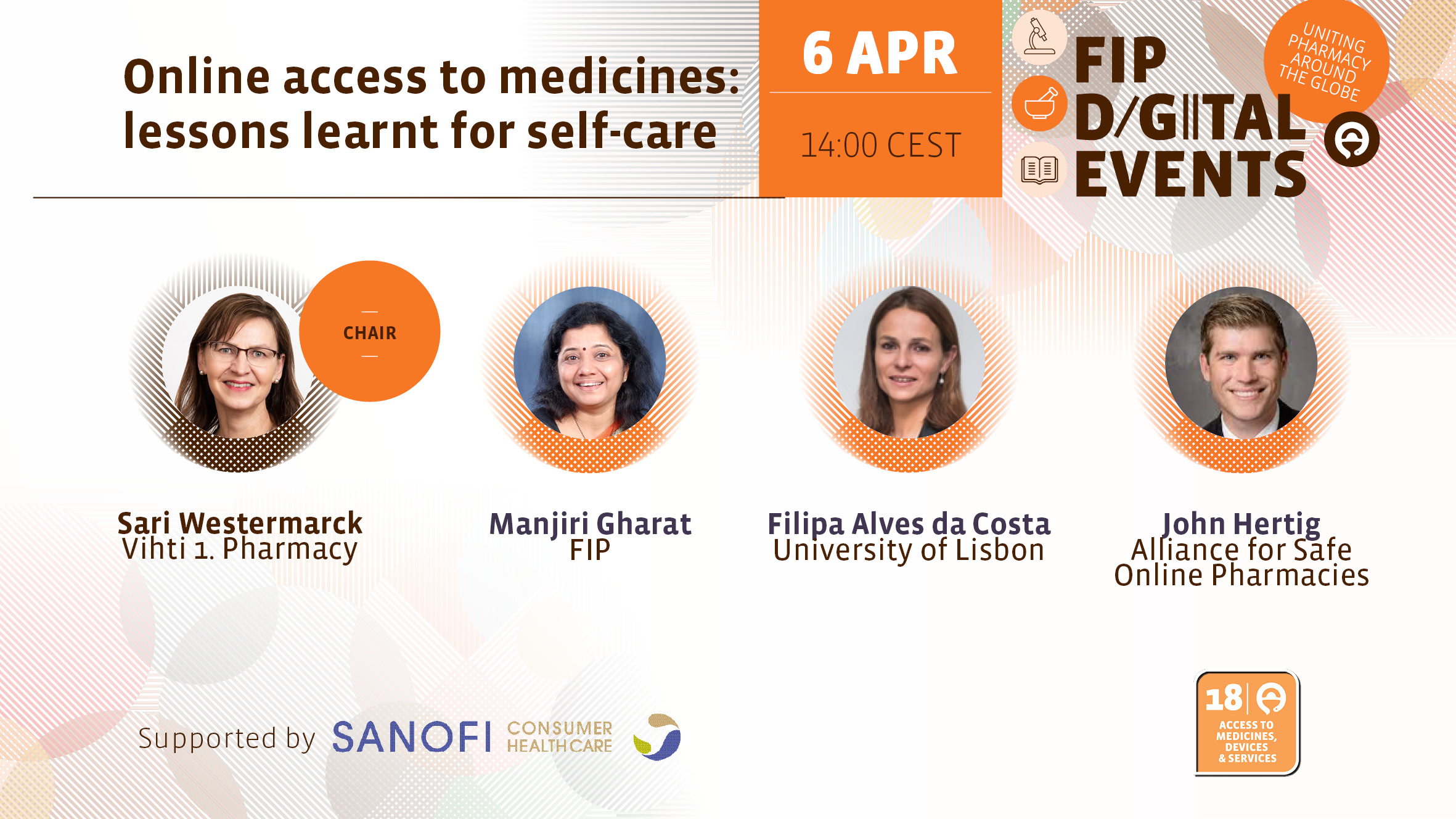
Online access to medicines: lessons learnt for self-care
Online delivery of goods became very common nowadays, and even increased during COVID-19 pandemic and related lockdowns. The way consumers obtain medicines, as special type of goods, is also changing. In some countries, buying medicines online is becoming common practice, because buyers are preferring to order their medicines through a click of a button rather than taking a trip to a pharmacy or a drug store. However, online customers may have difficulty knowing whether an Internet pharmacy is a legitimate operation, without the same confidence as they would have had in the neighborhood pharmacy. What are the practices in place to make sure that the online patient or customer can rely that they will receive the medicine they need? What are the advantages and disadvantages to accessing medicines on-line from patients, as well as from pharmacists’ point of view? Since medicines are regulated products and the need for consideration of ethical issues in access to medicines is important, the online pharmacy services have both advantages and disadvantages. What are the medicines patients are allowed to receive online in different countries? What is the scope of online pharmaceutical services vis-à-vis medicine procurement, distribution, online prescriptions, internet drug information, pharmaceutical care services, etc.?
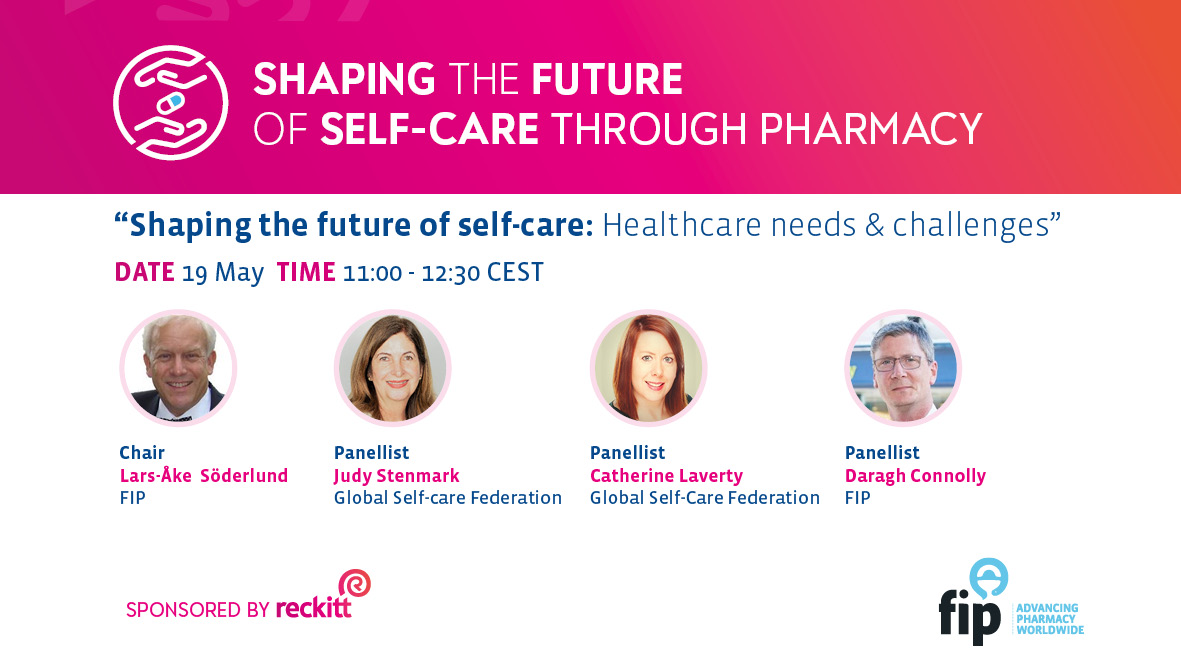
Shaping the future of self-care: healthcare needs & challenges
This event will set the scene for FIP’s self-care digital events programme. It will describe what the programme consists of and the main learning outcomes. This topic is important because pharmacy teams are increasingly supporting patients with self-care. The event will also describe what self-care involves, its benefits and the future of self-care. There will be a panel discussion about how pharmacy can shape the future of self-care.
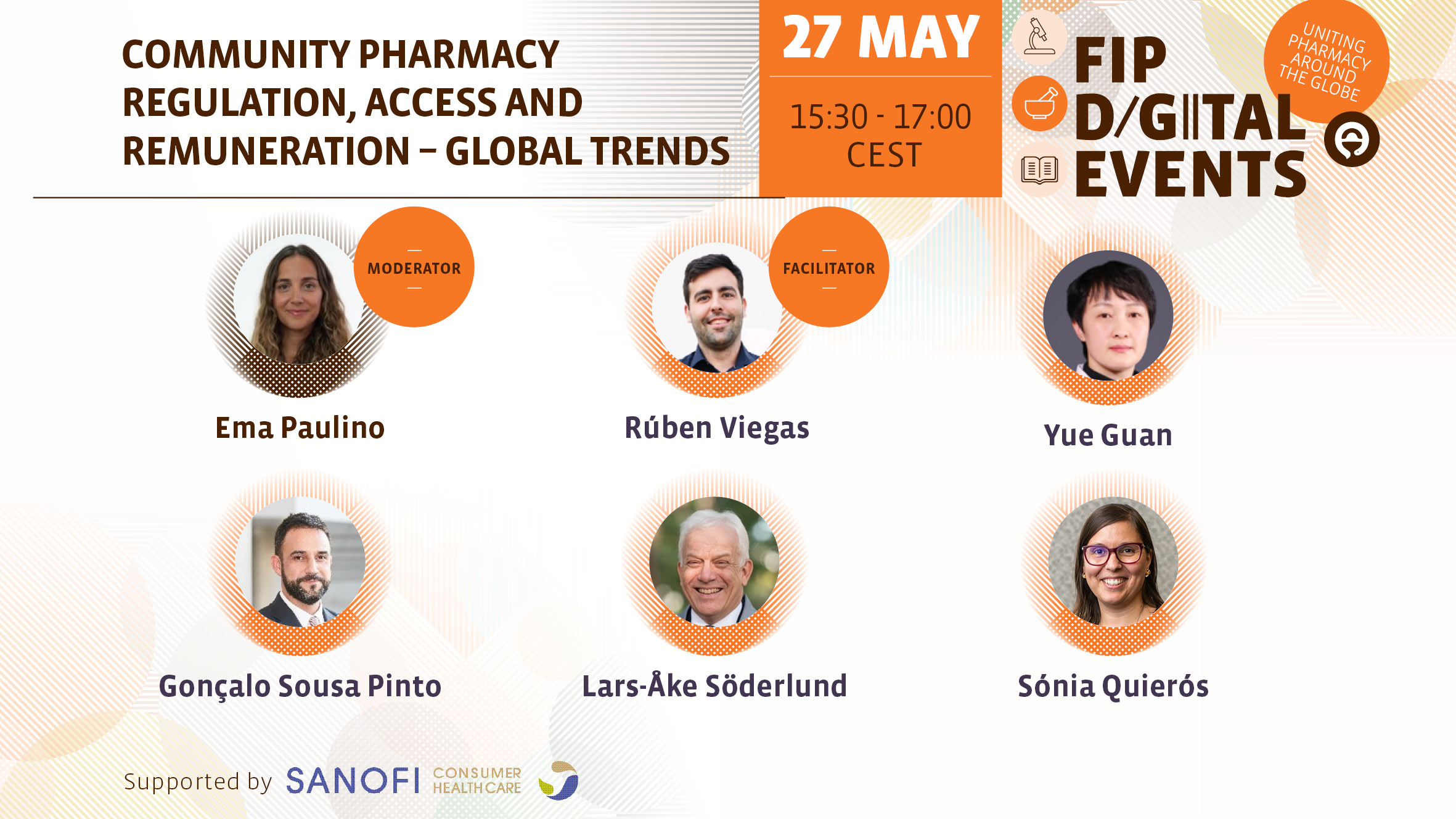
Community pharmacy regulation, access and remuneration – global trends
This webinar will present selected findings from a recent FIP survey on community pharmacy models and self-care. It will provide an overview of trends affecting community pharmacies’ sustainability, namely the impact of players such as Amazon or the evolution of remuneration models for professional services. It will also provide a snapshot of community pharmacy in China.
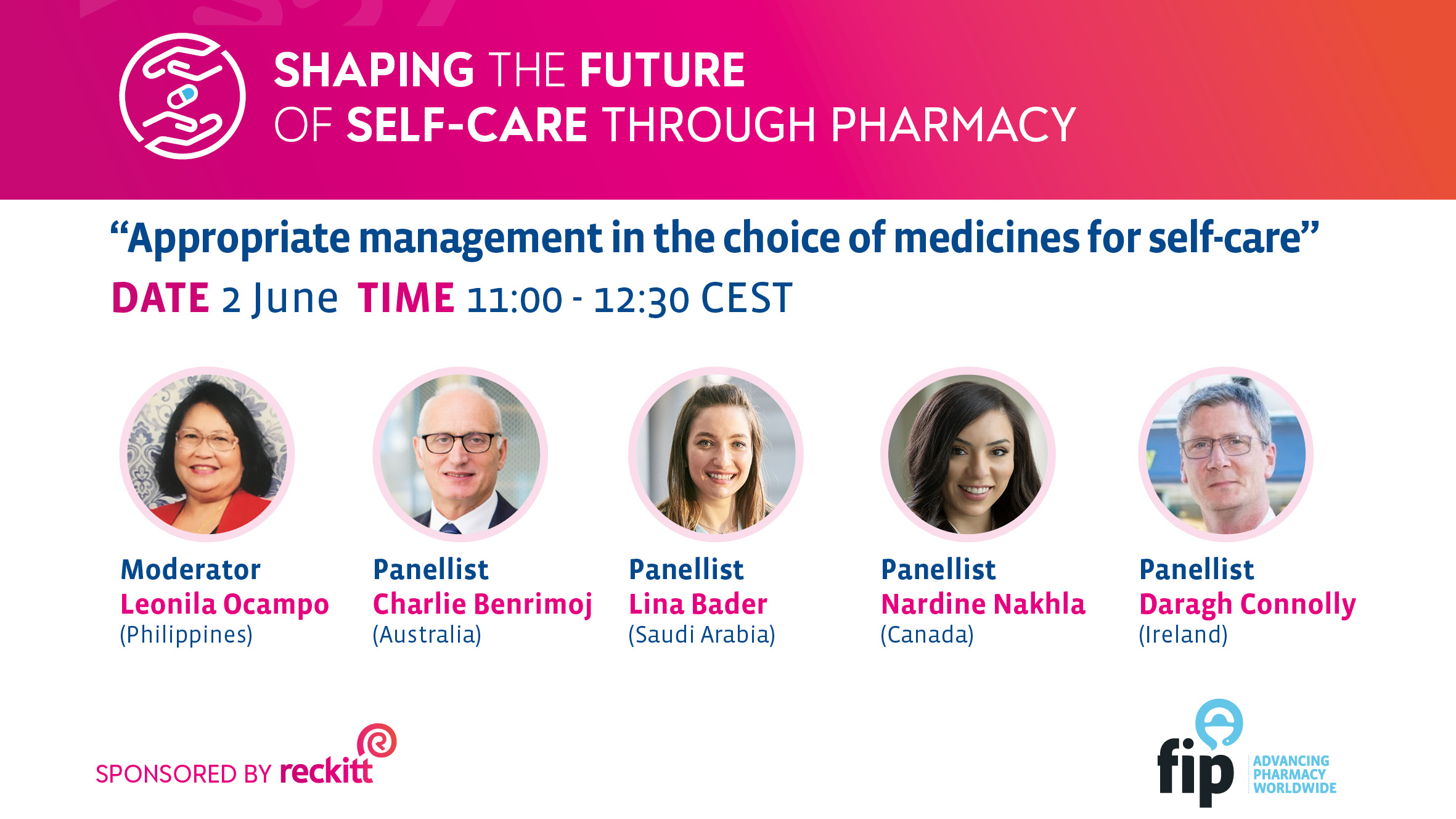
Appropriate management in the choice of medicines for self-care
This event will showcase the four pillars of the FIP Community Pharmacy Section’s Vision – review, prescribe, dispense, administer. It will also signpost how to empower patients, pharmacists, healthcare professionals about the value of selfcare and the importance of appropriate management for selecting medicines for self-care.
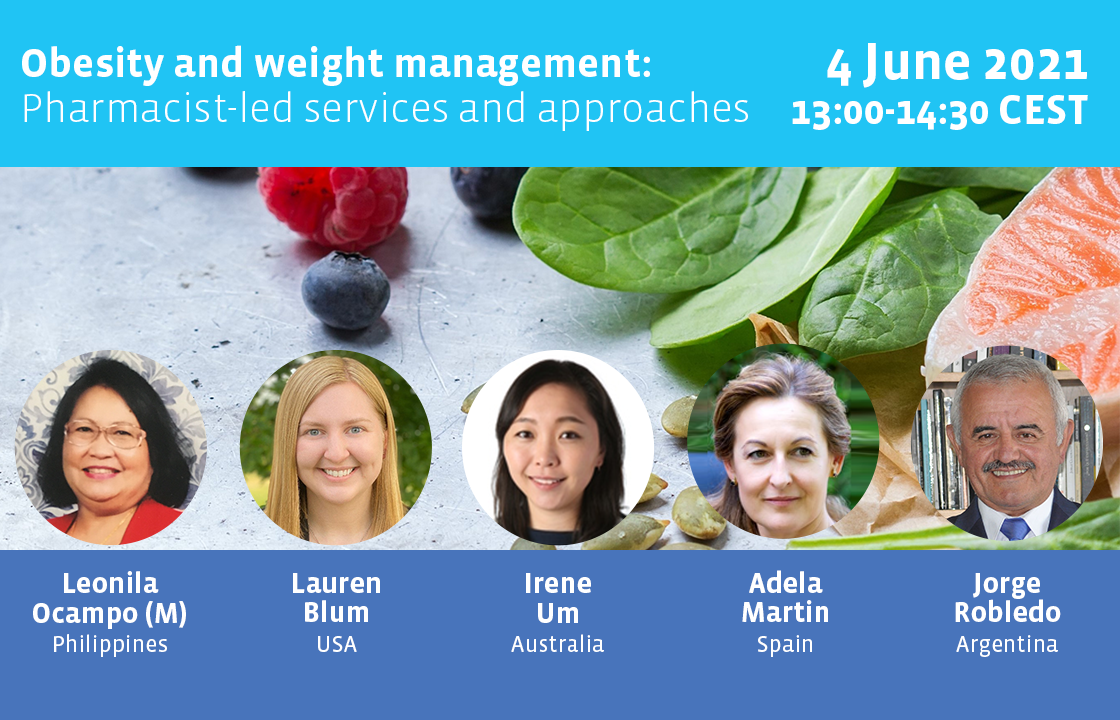
Obesity and weight management: Pharmacist-led services and approaches
This webinar will focus on the the role of community of pharmacists in weight management and obesity prevention, screening, referral and management, pharmacy-led weight management approaches and the intergenerational correlations in hypercholesterolemia and obesity. In addition, we will also present selected aspects from the FIP handbook on nutrition and weight management for pharmacists, to be launched that day.
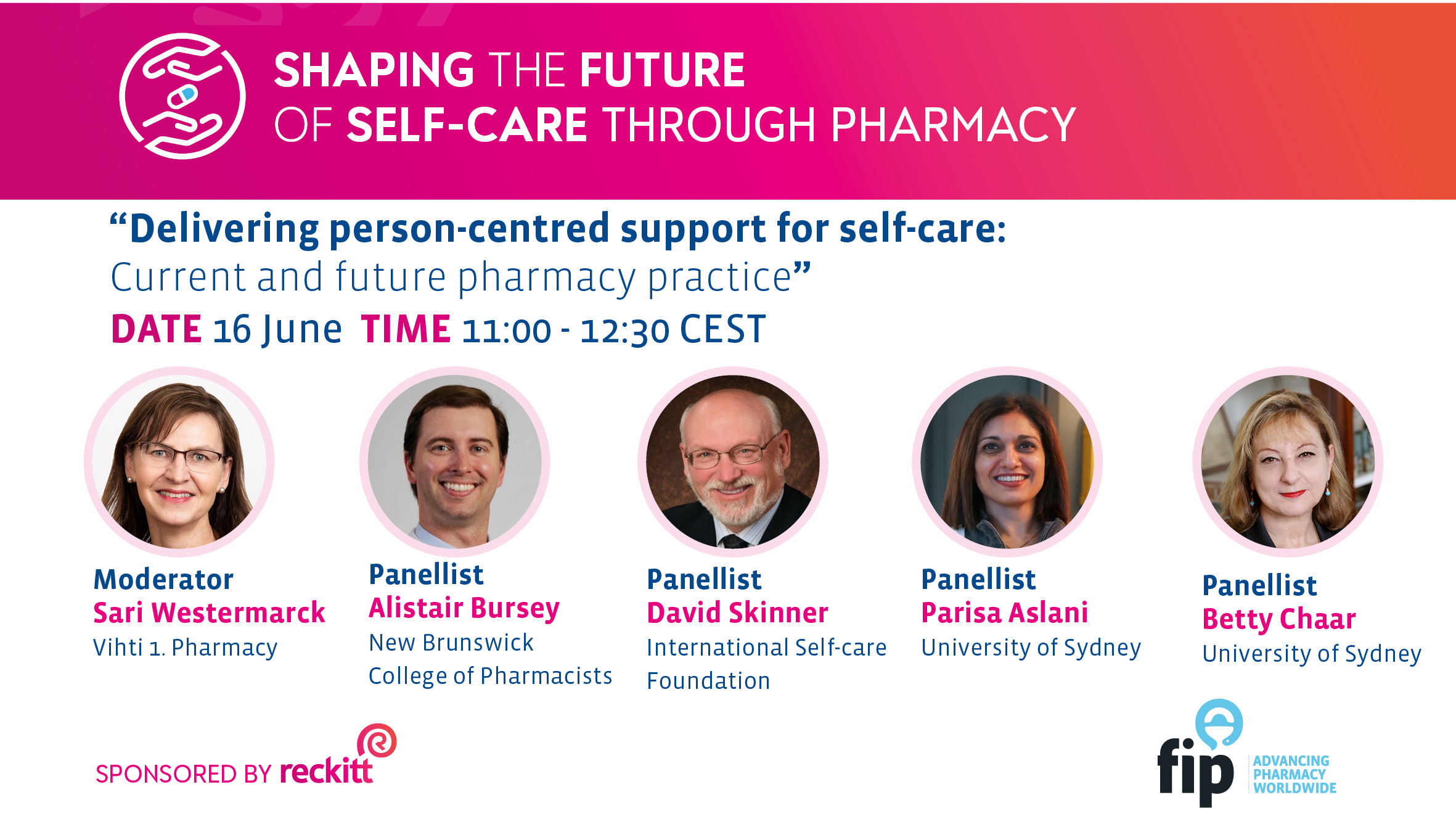
Delivering person-centred support for self-care: current and future pharmacy practice
This event will showcase current self-care delivery in community pharmacy across the globe and explore how future delivery could look. People centred care is at the heart of self-care and so this is an important area to explore including the associated communication skills. Strategies to build trust and rapport is vital to self-care will also be discussed. This topic is important because pharmacy teams are increasingly supporting patients with self-care.
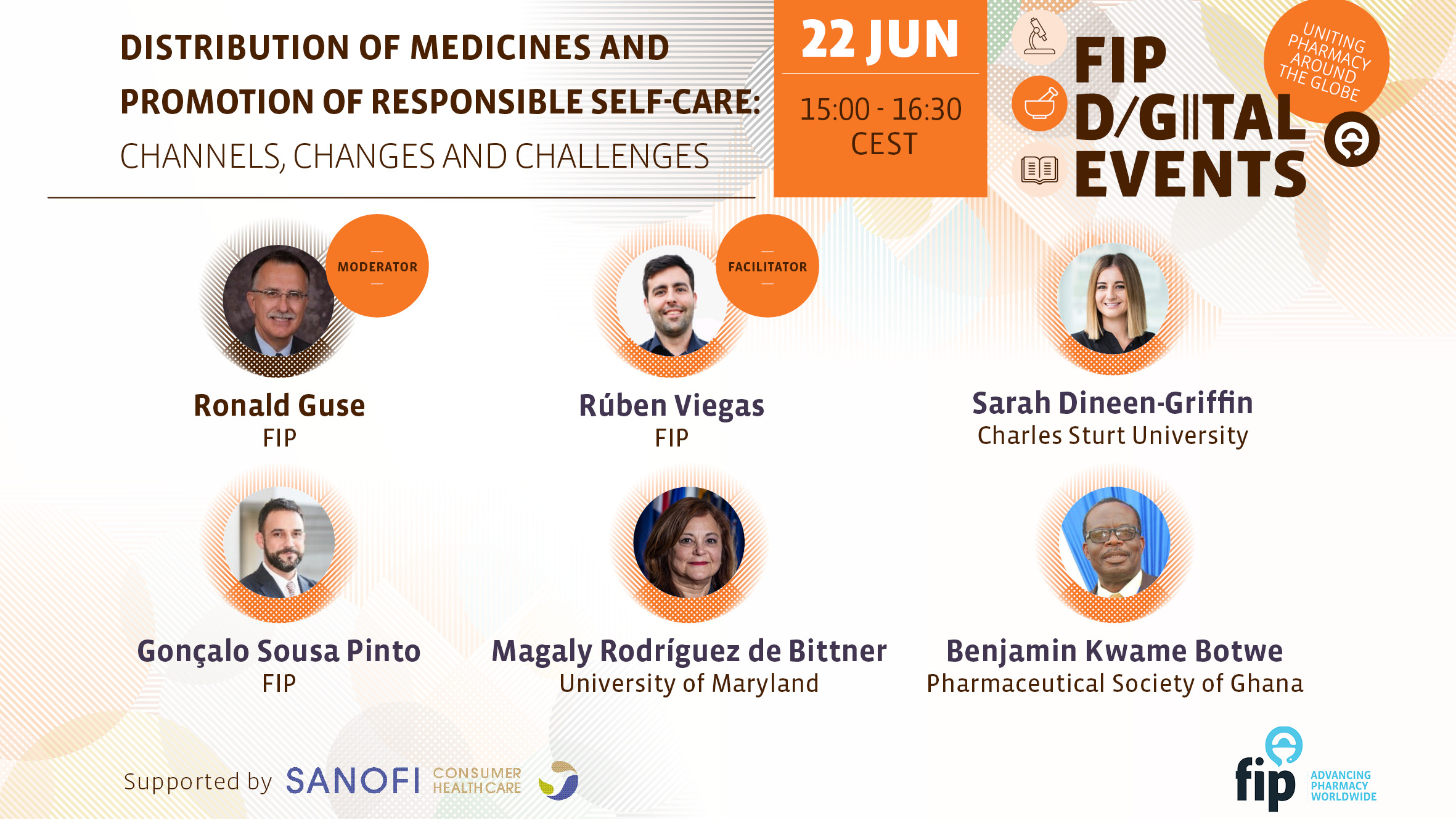
Distribution of medicines and promotion of responsible self-care: Channels, changes and challenges
This webinar will present selected findings from a recent FIP survey on the regulation of the distribution of medicines and pharmacists’ role in supporting responsible self-care. It will also focus on the role of pharmacies in relation to the use of generics, as well as alternative and complementary medicines.
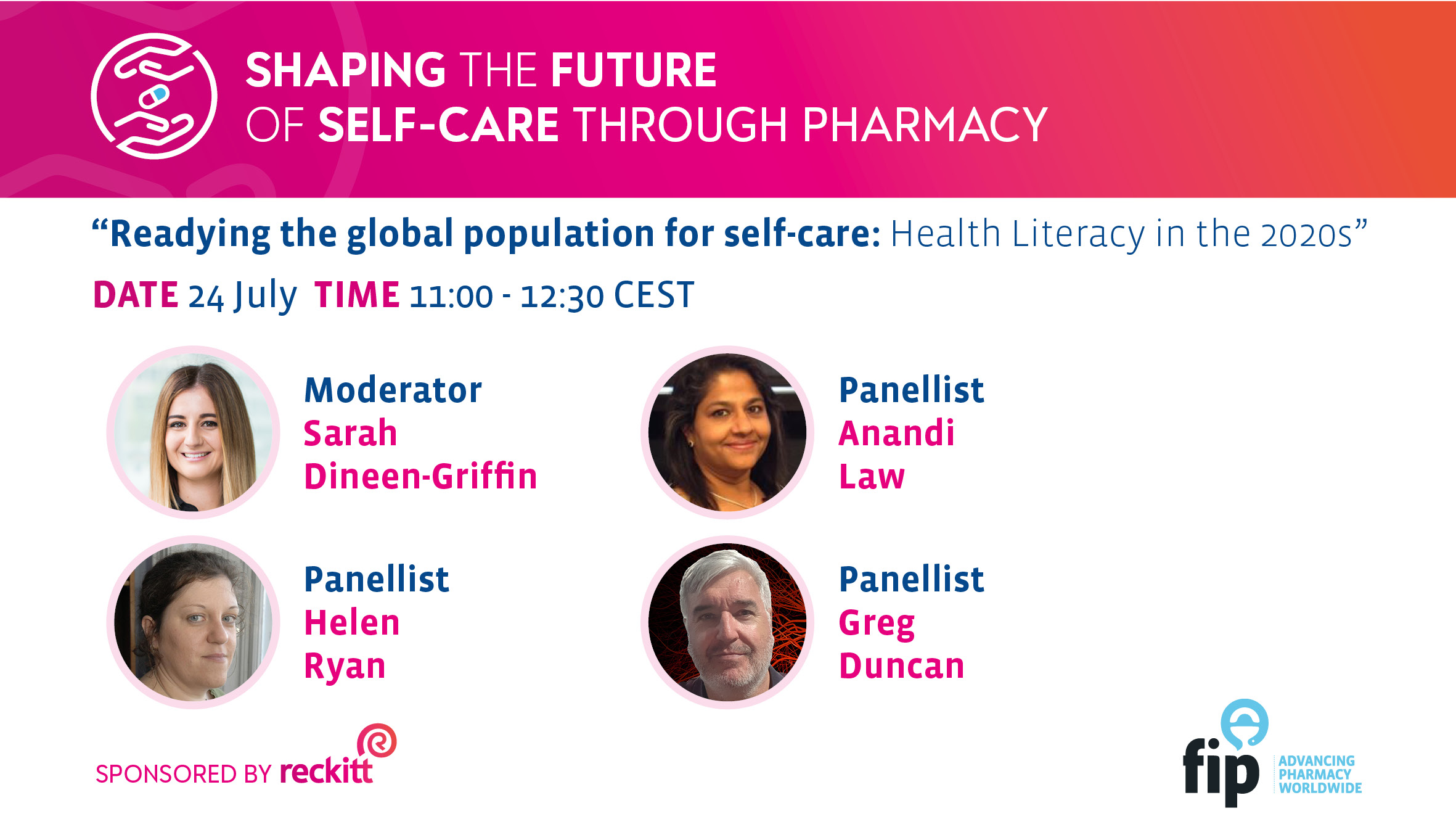
Readying the global population for self-care: Health literacy in the 2020s
This event will explore the evolution in our understanding of health literacy and identify practical strategies to improve health literacy in community populations. The role of the pharmacist in health literacy is also discussed.
Health literacy describes the skills that enable individuals to obtain, understand and use information to make decisions and take actions that have an impact on health. Several countries now have well established national strategies and plans to improve health literacy through programs to improve the skills of patients and the public, and service changes to reduce the literacy demands on patients and the public.
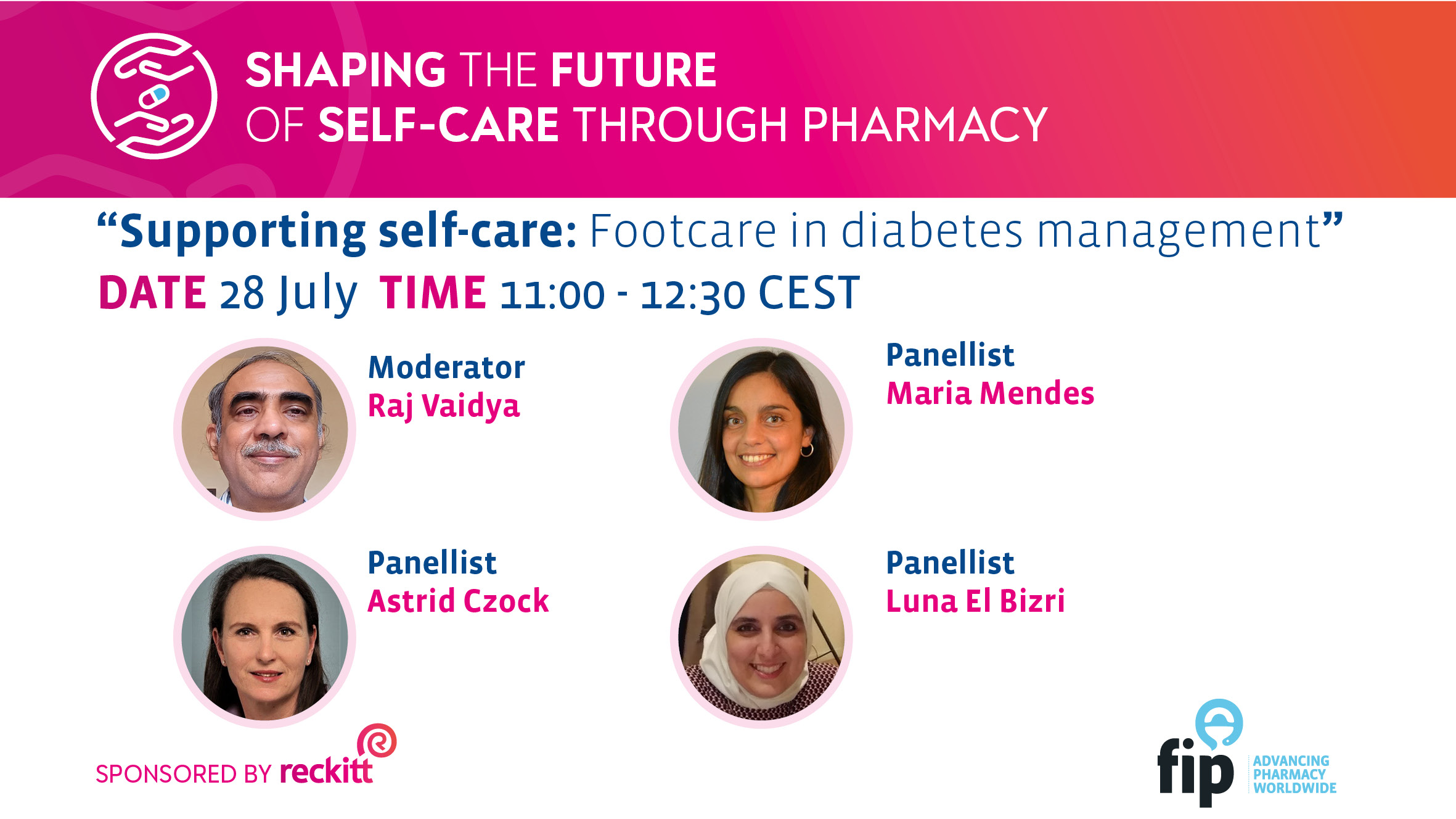
Supporting self-care: Footcare in diabetes management
Diabetic foot is a devasting complication of diabetes that can lead to loss of a limb and life. It has a complex pathology characterised by neuropathy, ischaemia and slow healing. Often the resulting loss in feeling leaves patients unable to sense the damage to their feet. 451 Million suffer with diabetes worldwide, 1 in 10 will get a foot ulcer, 80% go to have an amputation, 8 out of 10 amputations can be prevented by intervention.
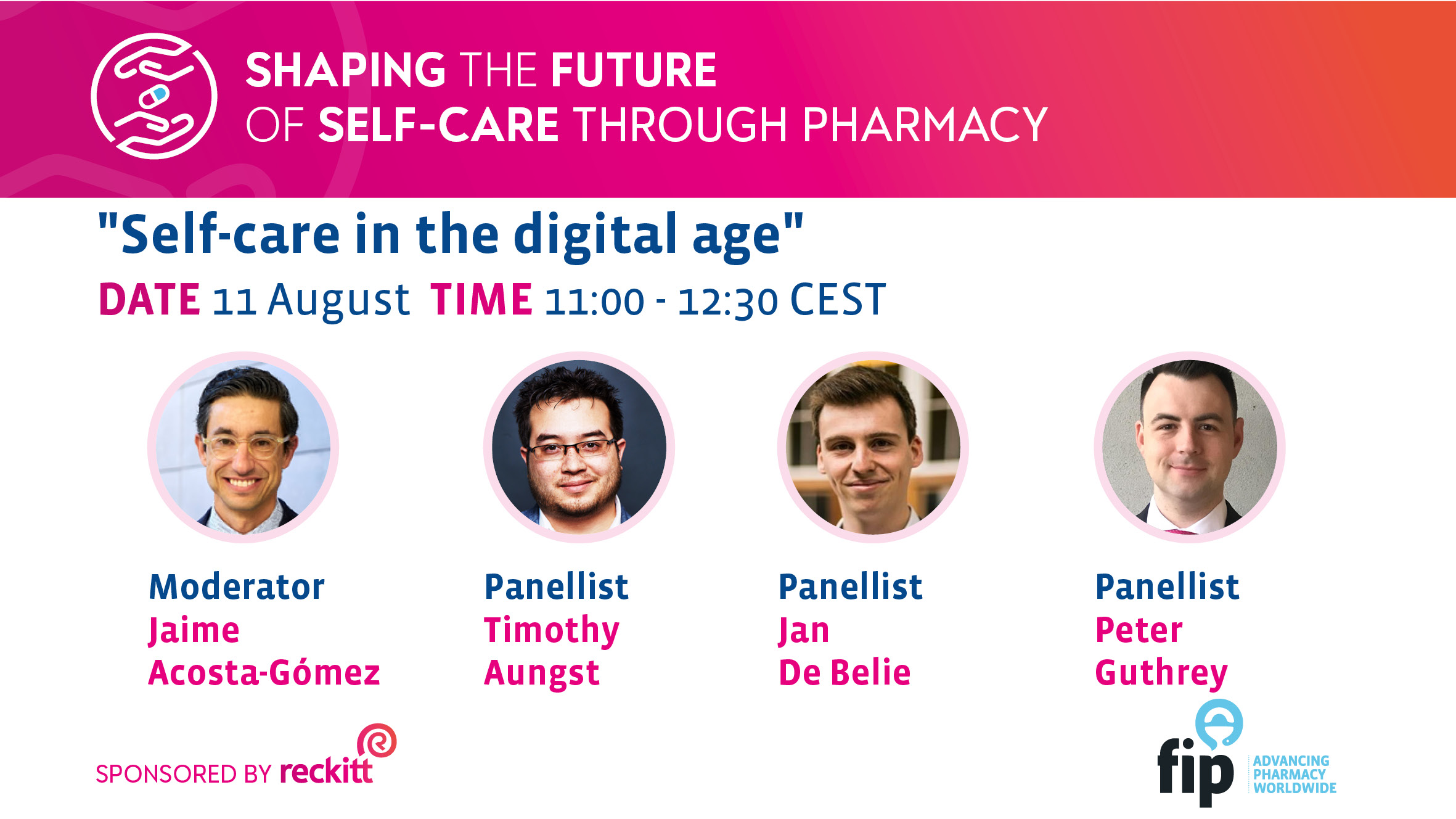
Selfcare in the digital age
This event will explore latest developments in digital health that supports self-care. It will identify practical strategies to appraise latest technology and manage misinformation and the ‘infodemic’. Current practice and role of the pharmacist in digital health is also discussed.
